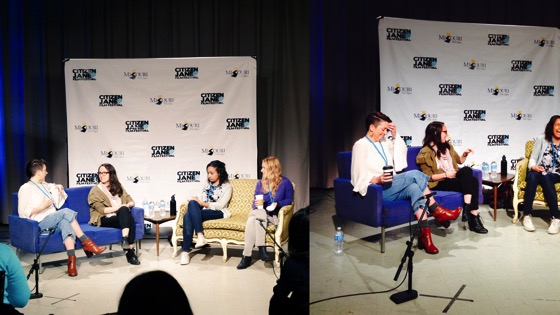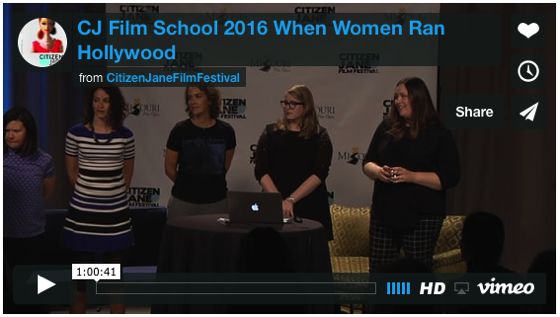Category: Academic
Badges! Badges! Get Your Badges! Stephens College’s Citizen Jane Film Festival via Instagram
Stephens College’s Citizen Jane Film Festival #cjff2017 #stephenscollege via Instagram
Setting up the Studio for pitch sessions, game show and papers from Stephens MFA students on early female Screenwriters. via Instagram
Setting up the Studio for pitch sessions, game show and papers from Stephens MFA students on early female Screenwriters. via Instagram
Good Morning, Columbia, MO via Instagram
A chilly start today to Stephens College’s Citizen Jane Film Festival. 40° This morning. CJ Film School all day today including presentations by Stephens College MFA in Screenwriting Students!
#cjff2017 #stephenscollege #movies #film #education via Instagram
Reading scripts on our flight from LA. Work. Work. Work. via Instagram
My Background from Giving Voice to Silent Films and the Far From Silent Women Who Wrote Them with Dr. Rosanne Welch [Video] (0:40)
Watch this entire presentation
A recording of my presentation at this year’s University Film and Video Association (UFVA) 2017 conference.
Transcript:
This is my background in the business. These are all the different shows that I worked on. Always with a focus on the female characters. How can I make the female characters stronger? I’m a girl. Interesting enough I have a boy — a son — and when I had him I thought, “Oh no, I’m supposed to have a girl so I can teach her to be a feminist.” and then someone went “No let me teach him to love a feminist.” and I thought, ‘Oh yeah.” So, and this is the stuff that I have written. Mostly focused on women — women in Doctor Who and how race is portrayed. Women in Aviation. I’ve just got a second encyclopedia set of women in History. I am part of the Women Screenwriters Encyclopedia and my latest book is on The Monkees and feminism in The Monkees because it was actually there in the show if you look hard enough.
Books Mentioned In This Presentation
- Without Lying Down
- Oscar Micheaux: The Great and Only: The Life of America’s First Black Filmmaker
- The Real Nick and Nora
- Doctor Who: The Writer’s Tale: The Final Chapter
- The Writers: A History of American Screenwriters and Their Guild
- Monster: Living Off the Big Screen
- “It’s the Pictures That Got Small”: Charles Brackett on Billy Wilder and Hollywood’s Golden Age
- Women Screenwriters: An International Guide
Follow Dr. Rosanne Welch
Twitter: https://twitter.com/rosannewelch
Instagram: https://www.instagram.com/drrosannewelch/
Podcast: Play in new window | Download
Subscribe: RSS
Dr. Rosanne Welch speaks on Gender Diversity in the Who-niverse: Paving the Way for a Lady Doctor at Last – Nov 16, 2017
Calling all Whovians – and those who plan to start binging soon! For her 5th Doctor Who lecture to the CPP community, Dr. Rosanne Welch will discuss how society – and the show’s writing staff – prepared the audience for a major change in this 50-year franchise – the creation of the first Lady Doctor!
Open to the public
Date: Thursday, November 16th
Time: 12pm – 1pm
Location: Cal Poly Pomona University Library
3801 West Temple Ave. Pomona, CA 91768
University Library (building 15), 4th floor, Events Room 4829
Remember the Ladies from Giving Voice to Silent Films and the Far From Silent Women Who Wrote Them with Dr. Rosanne Welch [Video] (0:56)
Watch this entire presentation
A recording of my presentation at this year’s University Film and Video Association (UFVA) 2017 conference.
Transcript:
This whole conference is about inclusion and convergence which made this topic seem useful to me and hopefully to you. I’ve always gone back from my childhood to learning about Abagail Adams — the woman who told John while you’re working on that Constitution, could you please “remember the ladies.” We tend to forget them in this town and int he history of this town. The other book that I’ve got there is “What Happens Next” which everyone uses in their classes and has a paragraph about the women that that entire book covers. He finds time to cover them in a paragraph and that makes my students crazy. They read 5 different books on the history of screenwriting and chronologically and they come to Frances last and they are like why, why have I not heard of her until now and that book was written in the middle so you know some men write books before that book came out. They didn’t know the women existed. Then they knew and they still didn’t’ write about them and it’s important that we are in these books. So. I thought that was my background.
Books Mentioned In This Presentation
- Without Lying Down
- Oscar Micheaux: The Great and Only: The Life of America’s First Black Filmmaker
- The Real Nick and Nora
- Doctor Who: The Writer’s Tale: The Final Chapter
- The Writers: A History of American Screenwriters and Their Guild
- Monster: Living Off the Big Screen
- “It’s the Pictures That Got Small”: Charles Brackett on Billy Wilder and Hollywood’s Golden Age
- Women Screenwriters: An International Guide
Follow Dr. Rosanne Welch
Twitter: https://twitter.com/rosannewelch
Instagram: https://www.instagram.com/drrosannewelch/
Podcast: Play in new window | Download
Subscribe: RSS
Join me at the Stephens College’s Citizen Jane Film Festival – Oct 26-29, 2017
Stephens College’s Citizen Jane Film Festival is fast approaching and the Stephens College MFA in Screenwriting will be out in force. Current MFA students will be presenting papers at the Festival, Stephens College will be sponsoring a production of a 5-minute film and hosting a live reading of the winner’s screenplay.
My husband, Douglas E. Welch, will be covering the event for me and the Festival, so watch my Twitter, Instagram and Facebook feeds for up-to-date information, photos and more.
Here are some of our big events:

Citizen Jane Film School
An afternoon of educational- and fun!- film industry discussions!
Studio A @ Stephens College, 1405 E Broadway
11:00 AM
Screen Grab: From Screenplay To Big Screen, Who Will Win?
Judges: Sarah Haas, Ken LaZebnik, Steph Scupham, Kimberly Skyrme
Screenwriters vie for an exclusive production deal pitching their films to a panel of esteemed judges. The top five entries will be discussed and critiqued live before the audience. The winner will be announced before panel’s end. Producer, Sarah Haas, awaits to bring the project to life-a screenwriter’s dream come true!
3:30 PM
Bold Brash Words From Bold Brash Screenwriters
Moderator: Dr. Rosanne Welch
Panelist: Amy Banks, Krista Dyson, Cara Epstein, Betsy Leighton, Laura Kirk, Sarah Whorton
The Stephens College MFA in Screenwriting Program is proud to present six of our fabulous students who will introduce the audience to six female screenwriters whose bold, brash, brilliant words have enhanced our film experience, but whose names have been left out of the textbooks. Help us write them back in and remind us all that Women Ran Hollywood once and are on their way to doing it again!

REHERSED: A CJ TABLE READ WITH GREENHOUSE THEATER PROJECT
Sager Braudis Gallery, 1025 E. Walnut
Sun / Oct 29 / 1:00 PM-3:00 PM
A staged reading of this year’s Screen Grab competition winner. Experience the art of Sager-Braudis Gallery, and watch as one of Columbia’s favorite theater companies reads a short screenplay. Refreshments provided by Harold’s Doughnuts and Fretboard Coffee.







![My Background from Giving Voice to Silent Films and the Far From Silent Women Who Wrote Them with Dr. Rosanne Welch [Video] (0:40)](https://rosannewelch.com/wp-content/uploads/2017/10/ufva-03-background.jpeg)









![Remember the Ladies from Giving Voice to Silent Films and the Far From Silent Women Who Wrote Them with Dr. Rosanne Welch [Video] (0:56)](https://rosannewelch.com/wp-content/uploads/2017/10/ufva-02-remember-ladies.jpeg)

